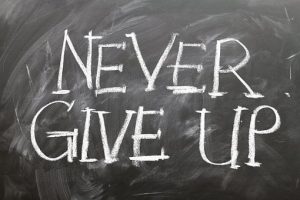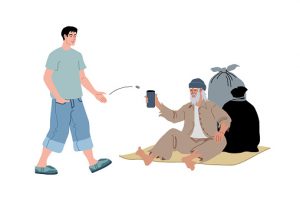We've all wondered at least once why we fail. Where are the obstacles and how can they be overcome? If you want to use all the opportunities you have, to be all that you can be, you need to understand the six keys to well-being and happiness. Every successful person has to, sooner or later. If you do, if you deal with them consistently, your life will be an unwavering success.
There are six essentials, six keys, that you can use as signposts to success. There is nothing particularly difficult and unclear about them. But they are decisive. If you master them, there are no limits to what you can do. Positive thinking and affirmations are only a start, but they are not the complete answer. Assertion without discipline is the beginning of delusion. Affirmation with discipline works wonders.
KEY ONE. Life will pay you as much as you ask of it
Ask for a quarter and that's what you get. If you understand how to manage your states and actions, you can change everything. You can learn what you want in life and be sure to achieve it. Sometimes I analyze the lives of my acquaintances and friends. I often find that we have shared challenges. The difference was in how we dealt with them. In some things they had succeeded, in others I had. I try to learn not so much from their failures as from the things they succeeded in and I didn't.
 In this line of thought, we can divide people into two types: those who want fish to feed themselves and others who want life's fishing rod to learn to fish for themselves. The first at first glance are more successful - they get the ready-made fish, they didn't bother to catch it, prepare it, they don't have any acquisition costs, and they just have to eat it so they don't get hungry. The catch here is that they remain dependent. From the one who brings them the finished fish. While the second group gets the fishing rod. They have to find the pond with fish, catch it themselves, invest money to do it (go to the pond, buy bait), then put in more labor to prepare it. And only then should they sit down to eat. Poor things, I hope they haven't starved to death before! However, they have much more. They have the chance that everything depends only on them. They will go to the lake when they decide and condition as many fish as they want. Yes, they will make an effort, but they will control the situation. And those, the first... they will not struggle, but will eat fish when and as much as they bring them.
In this line of thought, we can divide people into two types: those who want fish to feed themselves and others who want life's fishing rod to learn to fish for themselves. The first at first glance are more successful - they get the ready-made fish, they didn't bother to catch it, prepare it, they don't have any acquisition costs, and they just have to eat it so they don't get hungry. The catch here is that they remain dependent. From the one who brings them the finished fish. While the second group gets the fishing rod. They have to find the pond with fish, catch it themselves, invest money to do it (go to the pond, buy bait), then put in more labor to prepare it. And only then should they sit down to eat. Poor things, I hope they haven't starved to death before! However, they have much more. They have the chance that everything depends only on them. They will go to the lake when they decide and condition as many fish as they want. Yes, they will make an effort, but they will control the situation. And those, the first... they will not struggle, but will eat fish when and as much as they bring them.
There are many examples in life. I often come across calls for help on social media. A family in trouble, the parents unemployed, let's help them... and at the end of the call, a bank account. OK, I say, I'll send something today, someone else tomorrow, but that doesn't really solve their problems. They can't wait for handouts all their lives. It would be more helpful if someone offered jobs to these parents so they could feed their children themselves. The unfortunate thing is that many of the people who ask for help are actually looking for something easy and ready-made. And when the alms dry up, they again complain and howl for help.
Life does give you what you ask for, but you have to know HOW to ask.
- Ask specifically. Regardless of whether you want something from yourself or from another, you must first clarify clearly and precisely: what you want, where, when, how much, with whom, etc. It's not like saying to a friend or to the bank, "I need some money to borrow." It is necessary to know how much money, for what, for what period.
- Ask where it may be given. It's not enough to just want, you have to know which door to knock on. For example, you need a $2,000 loan because you have a health problem. And you ask your brother, but he refuses you. He's your brother, for God's sake, how could he not help!? Your brother probably has a great desire to serve you, maybe even without you paying him back, but how can he help you if he earns as much or even less per month…
- Create a benefit for the one you want too. If you have already decided from whom you will ask for something - money, a favor, try to find out what you can do to help him, and even give him what you can in advance. Or, going with your request, present the benefits he will have after doing you the favor.
- Be persuasive. The surest way to fail is if you show lack of conviction in yourself and in what you want. The person you are asking from needs to see that you are completely sure of what you want and will benefit both yourself and him. Even if you internally feel some doubts and hesitations, do not show them.
A friend says: "When I started working as a teacher, I did not have the necessary qualifications. Management hinted that if I decided to retrain, they might pay for my tuition. When I went to the director with a request to partially fund me, I stated specifically what major I had chosen and how much money I needed. Management did not approve of the specialty. They felt that the study time was too little and that some subjects were not emphasized enough according to the curriculum. However, I had firmly decided that this is exactly what I wanted to study. Not because it was the best in general. And because it was the best for me at that moment. Good as a ratio of time I will invest, finances and the knowledge I will get. This is exactly what I presented as arguments. They tried to beat me down with the fact that some disciplines in the specialty are not taught enough. I categorically demonstrated the opinion that I can acquire this knowledge additionally through self-study and without having to spend 3 years at the university, instead of one and a half. I pointed out what I have as experience and knowledge about the work I do and what I still need and that it is right there, in this specialty. In the end, I got what I wanted.”
- Ask till you get. If you're convinced of what you want, don't stop just because you've been turned down. Keep asking - from another person and in another way. Change and adjust until you get what you want. The more flexible you are, the better your chance of success. You've written a novel and want to publish it, but the first publisher you went to turned you down. Don't despair. Ask him to give you constructive criticism and ask about the reasons for the rejection. They may not publish works in the genre you wrote. Or not to publish unknown authors at all. Find out the reason and try to eliminate it. If they have objections to the quality of your writing, try to find out exactly what is wrong and fix it. After that, calm down, control the feeling of frustration and try to analyze the meeting quite impartially. How you presented yourself, what you said, how you asked, what you offered in return… try to find out exactly where the problem is rooted. Then choose another publisher, preferably several, and try again. Be flexible and creative.
KEY TWO. You have to learn how to deal with failure
If you want to become all you can, do all, hear all, see all you can, you must learn to deal with failure. They can kill dreams. It happens all the time. Failure can change a positive attitude into a negative one, an energized state into a paralyzed one. The worst thing a negative attitude does is that it destroys self-discipline. And when this discipline is missing, the results you strive for disappear. To ensure lasting success, you must learn how to deal with your failures. The key to success is big failures. Look at almost any great success and you will find that it was accompanied by great failures. Anyone who tells you otherwise knows nothing about success. There are two kinds of people – those who have dealt with failure and those who wish they had. In fact, if they have more success, people might have more problems. They just know how to deal with them, they work out new strategies, new alternatives. Remember that being rich is not just about having money. A great relationship brings problems and challenges. If you don't want trouble, you shouldn't be in a relationship at all. There are big obstacles in the way of great success - in business, in a relationship, in life.

Optimal Results Technologies teach us how to effectively deal with obstacles and disappointments. You can take the things that normally upset you and program them to inspire you. Tools like NLP are not just positive thinking. The problem with positive thinking is that we have to think about it - and by then it's often too late to do what you want. NLP offers a way to turn stress into opportunity. You already know how to take images that once depressed you and make them disappear, or change them into images that bring you inspiration. It's not hard to do. You already know how. Here's a two-step formula for dealing with stress. First: don't agonize over small things. Second: Remember - it's all small work.
All successful people know that success is the opposite of powerlessness. Unfortunately, some people can't get enough of the flip side. People who fail to achieve their goals are usually held back by powerlessness. They allow him to keep them away from the necessary actions that will help them achieve their desires. You can get through this hurdle by overcoming helplessness, by taking each setback as feedback from which you can learn and move forward. I doubt you will find many successful people who have not gone through similar experiences.
KEY THREE. You have to learn to deal with rejection
Is there anything in the human language that causes more pain than the little word "no"? If you work in trading, what is the difference between a profit of $25,000 and $100,000? The main difference is learning how to deal with rejection so that the feeling of fear doesn't stop you from taking action. The best salespeople are the ones who get rejected the most. They can use each "no" as a stimulus and a prelude to the next "yes".
 The biggest challenge for people in our society is that they can't handle the word "no". What would you do if you knew you wouldn't fail? If you know you won't fail, will that change your behavior? Will it help you do exactly what you want? What prevents you from doing so? It's that little word "no". In order to succeed, you have to learn how to deal with rejection, learn how to strip them of all their power.
The biggest challenge for people in our society is that they can't handle the word "no". What would you do if you knew you wouldn't fail? If you know you won't fail, will that change your behavior? Will it help you do exactly what you want? What prevents you from doing so? It's that little word "no". In order to succeed, you have to learn how to deal with rejection, learn how to strip them of all their power.
We all know who Sylvester Stallone is. Did he just show up at the door of an agent or studio and hear, “Hey, we like your body. We're going to shoot you in a movie”? It's not exactly like that. Sylvester Stallone became a star because he was able to deal with repeated rejection and rejection. When he started, he was rejected more than a thousand times. He went to every agent he could find in New York and was turned down by every one. But he kept going forward, trying and eventually making a movie called Rocky. He hears the word "no" a thousand times, but goes and knocks on the door number 1001.
How much "no" can you take? How many times have you wanted to go and talk to someone you found attractive and then decided not to because you didn't want to hear the word "no"? How many of you have decided not to apply for a job, sell something over the phone, or audition for a role just because you didn't want to be rejected? Think how stupid that is. Think about how you create barriers to yourself just because you're afraid of that little two-letter word. The word alone has no power. It cannot cut you or take away your power. Her power comes from the boundaries she forces you to set for yourself. And what do limited thoughts create? Limited life.
So when you learn how to exercise your brain, you can learn how to deal with rejection. You can even anchor so that the word "no" to stimulate you. You can take any rejection and turn it into an opportunity. If you're in the telemarketing business, you can anchor yourself so that simply picking up the phone puts you in a good mood instead of fear of rejection. Remember, success is the flip side of failure.
There is no real success without rejection. The more rejections you encounter, the more you will learn, the closer you will be to your goals. The next time someone rejects you, you should embrace them. This will change its status. Turn a no into a hug. If you can handle rejection, you will learn to achieve anything you ask for.
KEY FOUR. You have to learn to deal with financial difficulties
The only way to have no financial difficulties is to have no finances at all. There are many types of financial pressures and they have failed many people. They can create greed, envy, deceit or paranoia. They can desensitize you or deprive you of friends. Remember, I said they could, not that they would. Coping with financial pressures means knowing how to receive and how to give, how to earn and how to save.
 All our actions in life are guided by our philosophy, by our guiding inner ideas about how to act. They give us the pattern of our behavior. George S. Clayson provides a great model for dealing with financial pressure in his book, The Richest Man in Babylon. This is a book that can make you rich, completely happy and help you lead an exciting life. The most important thing the book teaches us, in my opinion, is the advice to give away 10 percent of everything we earn. That is correct. One reason is that you have to give back what you take out. The other is that it creates value for you and others. And most importantly, it shows the world and your own subconscious that you have more than enough. This is a very strong belief that must be maintained. If you have more than enough, it means you can have whatever you want, and so can others. And as you hold this thought, it gradually becomes true.
All our actions in life are guided by our philosophy, by our guiding inner ideas about how to act. They give us the pattern of our behavior. George S. Clayson provides a great model for dealing with financial pressure in his book, The Richest Man in Babylon. This is a book that can make you rich, completely happy and help you lead an exciting life. The most important thing the book teaches us, in my opinion, is the advice to give away 10 percent of everything we earn. That is correct. One reason is that you have to give back what you take out. The other is that it creates value for you and others. And most importantly, it shows the world and your own subconscious that you have more than enough. This is a very strong belief that must be maintained. If you have more than enough, it means you can have whatever you want, and so can others. And as you hold this thought, it gradually becomes true.
When should you start giving away ten percent of your profits? When you become rich and famous? No. You should have done it from the start. Because what you give to others becomes something like the seeds for sowing. You should invest them, not eat them, and the best way to invest them is to give them away so that they produce value for others. It's not that hard to find how. There are those in need all around us. One of the most valuable things when you do this is the new self-confidence. If you are one of those who try to discover and satisfy other people's needs, it gives you a different self-confidence. These kind of feelings or states ennoble your life and make you noble.

A friend of mine talks about his modest but regular charity: " He always takes the same route on his way to work. Every day I meet the same people begging - a good-natured blind man standing at the end of the underpass, a petite old woman by the church, a middle-aged man in a wheelchair, and an old man stretching out his hand in the square by the fountains. Apart from them, the same street musicians often roam the area - old men with accordions, a violin and a singer. Every month, on the day after payday, I created a ritual. In the morning or in the evening, passing by, I leave them something. It's not much, and I'm not obliged to support half the city, which, by the way, is full of people begging for a piece of mind. I give as much as I judge at the moment that I can afford. I once had a few tens in my pocket and no change. I enjoyed it. But I didn't feel bad. The next day, I prudently brought smaller money with me and "paid off". And every time I realize that my modest donation is not worth a smile or a sincere "God bless you" at all.
When you get your paycheck, pay off your debts first. If you don't have temporary obligations to banks, friends, etc., there remains the monthly bill, which we can't escape anyway. Then give some to charity. It doesn't even have to be exactly ten percent, as we are taught in the thick books. Just do it regularly and wholeheartedly. Try to set aside ten percent of your income as well. Either put them aside as savings or invest them in something. Learn to live with 70 percent of what you have. Money must be used as capital. It is wrong to spend all that we earn. Before spending any amount, let's ask ourselves: "Do I really need this?". Of course, we don't need to pinch every cent, one should also indulge one's soul. If you usually eat ice cream for BGN 4, treat yourself to a more expensive one once every two months.
Money is like everything else. They can work for us if we make them, but they can also work against us. We must learn to earn, save and give. This way we will deal with the financial pressure and money will no longer make you unhappy.
When you master the first three keys, you will begin to feel that your life is completely successful. And here comes the turn of the next key.
KEY FIVE. Dealing with complacency
Comfort is one of the most destructive emotions. When a person reaches the peak of his comfort, he stops growing, developing, moving. You shouldn't be too comfortable. One either goes up or goes down. When a plant is green, it grows. When it ripens, it starts to rot and dies. A person must keep himself in a "green" state, which makes him constantly develop and grow. We can use any experience to grow. Development and movement are not directly proportional to age. A person who has just retired can perceive this fact in two ways: as the end of his life, a stop at which he sits, waiting for the physical end, or as a new beginning of a different life - a new venture, a journey .
One of the biggest mistakes we make is comparing ourselves. In fact, on the one hand, comparison is a good thing, because it helps us to "check our clocks". But we have to be careful who we compare ourselves to. If we decide that we are doing well, compared to those around us, it does not necessarily mean that we are doing well, but rather that others are not doing well enough. Let's judge ourselves by the goals we set for ourselves instead of what the people around us are doing. Let's strive for things that we ourselves want, not what someone else does. Because there will always be someone who has more than us: a bigger house, a higher salary, a vacation in a more luxurious hotel. Before we decide that he has more, let's ask ourselves what of what he has we actually want and whether we want it. The same goes for people who seemingly have less than we do. If John has a house on one floor and is visibly happy with life, and I have three apartments in the center, it most likely means that John just wants a small, modest house.
The trap of complacency and comparison can be found in every aspect of life. Valya's husband turns out to be far from what she imagined for a man to spend the rest of her life with. Yes, he was earning well, but that's about it. He was almost not interested in her, he was mainly interested in work, he did not help her with the children and the household, although he had the opportunity to buy her a bouquet every night for five levs, he did not think of giving her a flower for a leva either. This tormented her internally, this indifference of his was slowly killing her soul. But every time she met her neighbor Anna and saw her bruised eye or heard the scandals from the window, Valya was satisfied that there was worse. No, she did not gloat that Anna's husband was a drunkard and often beat her. On the contrary, her heart sank with grief. But seeing the bruised Anna, Valya put her dissatisfaction to sleep and suppressed her own desire to fight for a marriage in which there was no violence, but also no cohesion and reciprocity.
We can't help but compare ourselves to others, it happens somehow unconsciously. But the better we control this and the more often we challenge ourselves, regardless of the status of those around us, the more special our lives will be.
KEY SIX. Give more than you expect to receive
And this is perhaps the most important key. The problem in life is that people only want to receive, or at least first receive and then eventually give. If, say, the relationship between spouses is not working out, each expects the other to be the first to step up and make an effort. And so a stalemate ensues, slowly killing what was once between them. Success is not a mountain to climb or something to be possessed. Success is a process, an eternal movement, a way of life.
Everything in the universe is balance. When we give more so that the energy balance is not disturbed, we subconsciously encode a message in the space that we have to receive accordingly. And vice versa – if you have given less than you have received so far, the energy space encodes the idea that we are debtors. And life puts us in situations so that we get our due back. To get, you have to give!
© 2023 Iliana Dechkova


